Shane Warne forever changed world cricket, inspiring a generation of Australian kids to dream of being a leg-spinner for Australia. At one stage an aspiring VFL/AFL player, Warne would carve out one of the greatest sporting careers Australia has ever seen, although it wasn’t without controversy. Off the field he was a family man and great mate. Forever talking about his three children and his pride. We recap the highs and lows of an unforgettable life.
WARNIE THE PROUD FATHER
By Jackie Epstein
Out of all the incredible achievements in his life, Shane Warne was most proud of the father he’d become.
He realised at times that he hadn’t been the greatest role model for his three children, but it was always evident he shared the deepest bond with Brooke, Jackson and Summer.
Jackson, or ‘Jacko’ as he liked to call him, was his best mate. The 22 year-old was his poker playing buddy, they watched TV and movies together, they went on road trips and attended events together — the most recent being the Australian Open men’s final and the twilight beach polo in St Kilda.

When Jackson competed on SAS: Australia in 2020, Shane loved watching every minute of his son’s TV debut.
“I’m so proud of him for what he did on the show,’’ Warne told the Herald Sun at the time
“For a young man to do what he did on that show with people who were older and more experienced, stronger, all those things. It’s great everyone has got a chance to see Jackson, my son who I love and have tried to help out and teach him right from wrong, manners and being polite.
“He’s just such a good young man and the public have seen what a delightful young man he is. I’m really proud of him.”
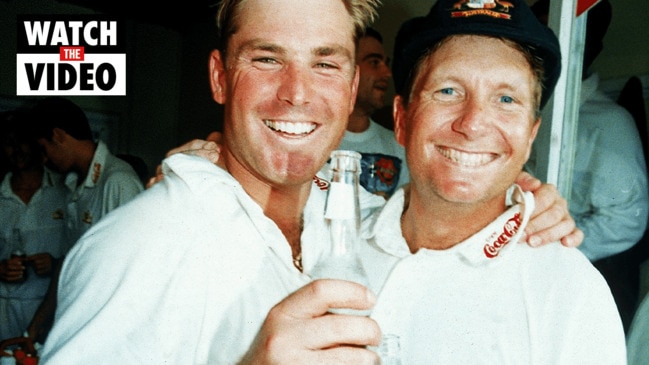
Shane used the word proud often while talking about his children.
When Summer finished year 12 at the end of 2020, he said: “I’m so proud of her to do that with all the challenges of Covid. She wants to rule the world. She’ll be doing acting, dancing, singing, something on stage.”
Brooke turned 24 in June last year. He was very protective of his eldest child and would never miss a chance to post birthday tributes for all three.
“I love you up to the sky and back and am very proud of you everyday,’’ Warne wrote about Brooke.
He also added that he couldn’t be happier with the person she’d become.
Jackson is a Lego-loving gym junkie and although he showed a real sporting talent, he never pursued cricket due to the attention of being Shane Warne’s son.
Instead he developed his love of poker and is an accomplished player who wants to leave a legacy in the field.

“As much as I would have loved to play cricket with Jackson, even just socially, I understand the expectations on him,’’ Shane said last year.
“We’ve found poker together so the good news is poker goes to some pretty cool places that cricket didn’t.
“Luckily over the years I taught Jackson how to play. There’s a bit of a stigma that it’s back alleys and smoke but it’s actually a sport and is played all over the world.”
Jackson and Brooke featured on the documentary called Shane, which aired in cinemas earlier this year and is now on Amazon Prime.
In a frank discussion about it during the Sydney test match in January, Shane said: “I’ve been very, very lucky in my life. I’m very grateful for the life I’ve had. Had over 13 books written about my life, a stage musical and now a documentary.
“It’s the first time my children have spoken, my parents. A lot of things were hard to talk about … they know I love them very much.”
WARNE SCANDALS, CONTROVERSIES WHICH MADE HEADLINES
By David Riccio
Colourful if not controversial. Feted yet at-times foolish.
Tiger Woods, Michael Jordan, Andrew Johns and Muhammad Ali, gods in the sporting pantheon, shared the same rare air as Shane Warne.
Greatness wasn’t their only commonality.
They also experienced the taste of rock-bottom.
Perhaps it’s the cocktail of pressure, fame and a desire to be ‘normal’, that sport is littered with the best of the best, being forced to duck and dive through off-field scandals.
The spin-king was no different.
From a brutal sledge of former Test captain Steve Waugh, who Warne called “easily the most selfish cricketer I ever played with” to breaching a contract with Nicorette — a nicotine replacement gum — in 1999.
Reportedly smoking up to 50 cigarettes a day, Warne only needed to survive another five-days to complete his four-month long sponsorship deal with Nicorette worth a reported $200,000.
Yet the Australian vice-captain at the time was caught photographed puffing a cigarette in a bar in Barbados.

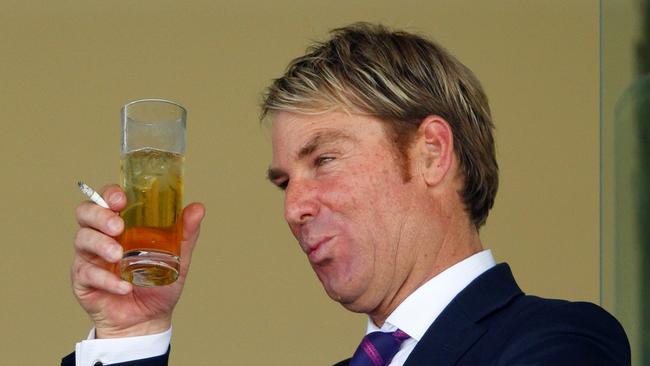
“Unfortunately I had a night out with the lads,’’ Warne said.
“It was quite late at night and I gave into temptation once.
“Hopefully it’s only a one-off thing. As far as I’m concerned it is and I’m going to try and kick the habit for good.’’
Warne already had experience with how to deal with turmoil off the field – thrust into the spotlight just 12-months earlier with the revelation that he and teammate Mark Waugh had taken a bribe from “John” the bookie during Australia’s 1994 tour of Sri Lanka.
Remarkably, the betting furore failed to emerge until four years after the exchange of money for pitch information.
Warne and Waugh came clean in 1998 that they had provided “John” information regarding the pitch and match conditions in exchange for $8,000 and $10,000 respectively.
Neither were suspended.
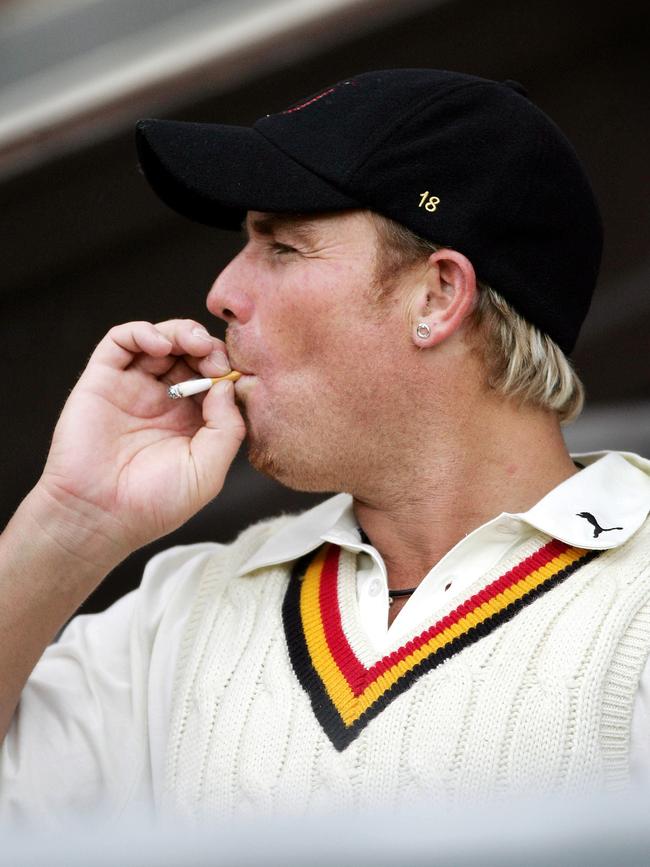

Warne would state afterwards that he didn’t think the information provided would spark the backlash that ensued.
“I realised that I was very naive and stupid,’’ Warne said.
“I was fined $8,000 by the ACB and paid the fine immediately.
“I’ve had no contact with the bookmaker since and I’m very disappointed and sorry for my actions.
“I’ve always strived to do the best I can for my country and I think the way that I play and conduct myself on the field, shows I’m a cricketer with integrity.’’

But perhaps the greatest scandal to rob him of time on the pitch was when he was suspended for 12-months after testing positive for consuming a banned diuretic drug on the eve of the 2003, ODI World Cup,
A fortnight before the ICC Cricket World Cup 2003 in South Africa, Warne had announced that he would be calling time on a decade-long ODI career.
Warne was Australia’s highest wicket-taker at the time with the illustrious spinner the sixth-highest wicket-taker in the world.
Another reason behind the tournament being all the more special for Warne was that he had injured his shoulder in December 2002 while playing in an ODI against England and was facing a prospect of missing the World Cup.
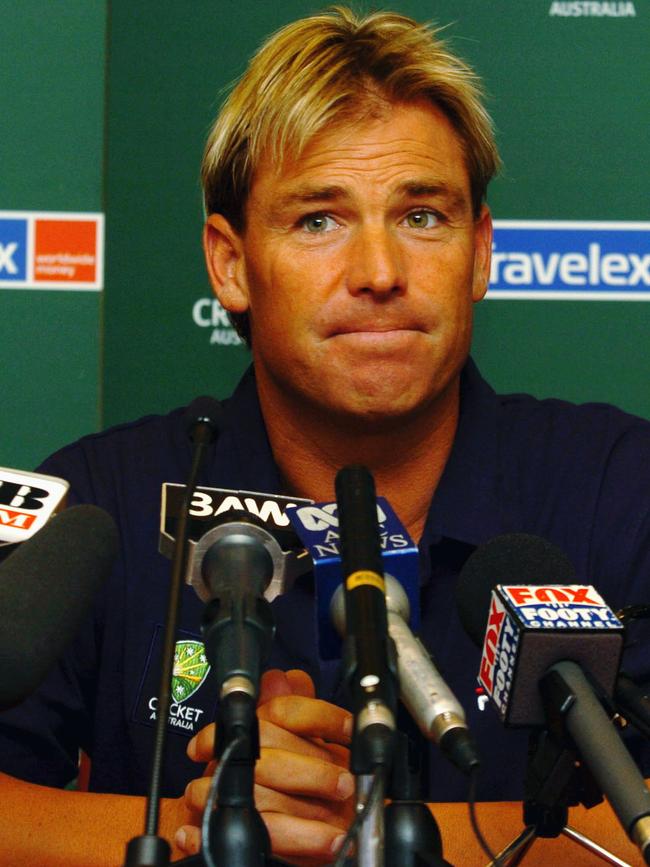

An exceptional five-week recovery saw the then 33-year old bowler take the field in an international match in January.
However, Warne’s world came crashing down following a routine urine sample from anti-doping officers just one day before the World Cup in South Africa.
The Australian cricket icon had innocently been given a slimming pill by his mother Brigitte Warne, to help with his high blood pressure and assist in weight loss.
Upon his return in Melbourne, Warne admitted to consuming a tablet given to him by his mother to make sure that he looked good in front of television cameras.
“Contrary to speculation, taking it had nothing to do with the treatment for my shoulder injury or for masking any banned substance,” Warne said.
Warne also mentioned that he did not read the ACB’s playing conditions and that consuming such a table without knowing about its components was “a reckless act, totally disregarding the consequences”.
Warne also hinted at the torn packaging not allowing him to read the list of ingredients.
But what pained Warne, for years after, was any suggestion that his mother was to blame for the entire scandal.
“She is just a wonderful human being. My mum is my hero,’’ Warne said in an interview only two years ago.
“What a tough time it was for mum, and all of the family.
‘It was one of those moments, where it was just so innocent, to end up being such a big thing was a real shame. I never, ever blamed my mum.
“I have never blamed my mum. I thought it was important to clarify where the tablet came from.
“It [taking the drug] had nothing to do with cricket or trying to mask anything. It had to do with appearance.’’
In a recent interview with Fox Sports, Warne summed up his colourful career, claiming he found it funny how people often wanted to talk to him about the many scandals and drama during his career.
“Really, across a 20-year career, there were only a few things that went circus, that were a bit chaotic,’’ Warne said.
“There were far more great times, far more.’’
THE GENIUS OF WARNIE ON THE FIELD.
It wasn’t one thing that made Shane Warne great. It was a subtle blend of physical and mental gifts that made him the ultimate spin bowling menace.
And it changed throughout his career. Early on, Allan Border reckoned he leant heavily on his hard spun leg break. Then he added some tricks. Then, as his physical gifts waned, he worked on batsmen with his mind.
His weaponry included …

THE FINGERS
Warne always feel his barbecue sausage fingers helped to give him extra purchase on the ball.
Ask Warne what made him great and his first gesture would be to look down at his meaty fingers and say “these helped.’’
With wide, powerful fingers came extra grip and extra revolutions on the ball and extra control.
THE SMARTS
Warne was a smart bowler. Allan Border said on Saturday that the older he got and the more his physical gifts waned the more he used his mental powers to get on top of batsmen.
Merv Hughes said we saw it during his Big Bash commentary when he played for the The Stars at the end of his career.
“He predicted how he would get someone out and then it would come true,’’ Hughes said. “He was brilliant like that.’’
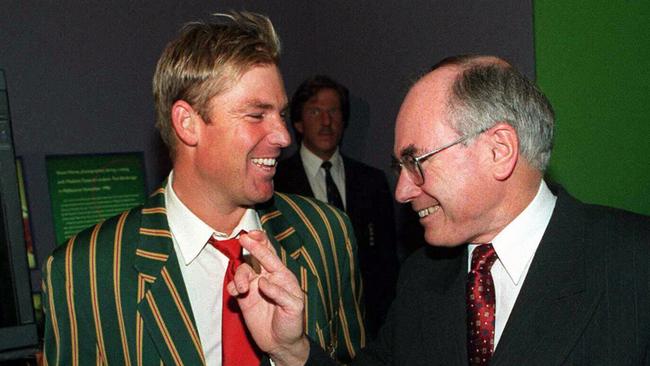
THE AURA
“It starts with the eyes,’’ England batsman Mike Gatting once said of Warne’s intimidating aura.
Gatting, unlucky enough to cop Warne’s ball of the century, noted that Warne switched the on button to his commanding aura when he stood at the top of his mark rolled the ball hand to hand and just stared at the batsman.
From there things often just got worse.
THE VARYING TURN
Former Test selector and leg-spinner Trevor Hohns was once asked what quality about Shane Warne impressed him the most.
“He can vary the amount of turn he puts on the ball,’’ Hohns said.
He noted that cricket history is dotted with leg-spinners who were accurate but did not overly turn the ball and others who could turn it sharply but struggled to his the spot.
Warne mastered both categories. Very few do, perhaps none ever as well as him.
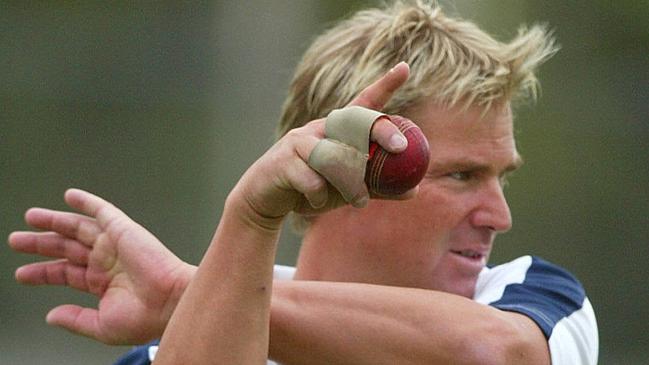
THE MENTAL GAME
Once Warne had a spell over a batsman he rarely let them break free. He rose to the challenge of keeping a batsman under his thumb.
Often it was not so much a major sledge as simply a cutting throwaway line.
His greatest bunny was South African batsman Darrell Cullinan who admitted in a story he had seen a sports psychologist to handle the threat of Warne.
Warne saw it and when Cullinan came to the crease pointedly said within his earshot “OK then, now, let’s just see if we can get you back on that couch shall we?’’
THE BIG OCCASION BOWLER
Some players ran away from the fire when the heat is at its greatest – Warne always wanted the ball.
He wanted to be the hero. The matchwinner. It was a huge quality.
THE TOUGHNESS
Warne never got the credit he deserves for being physically and mentally tough.
In 1999 before shoulder surgery he bowled through incredible pain and just kept going.
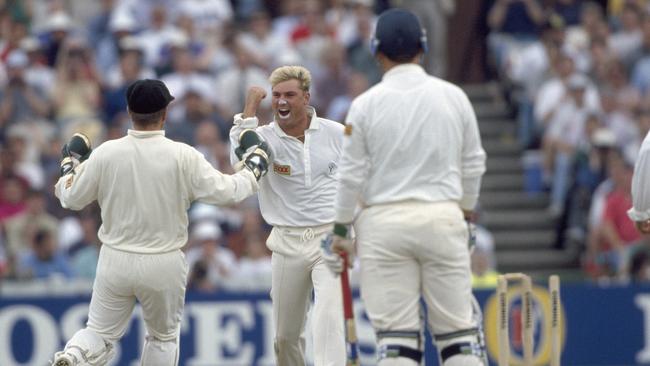
WARNE’S 10 GREATEST MOMENTS
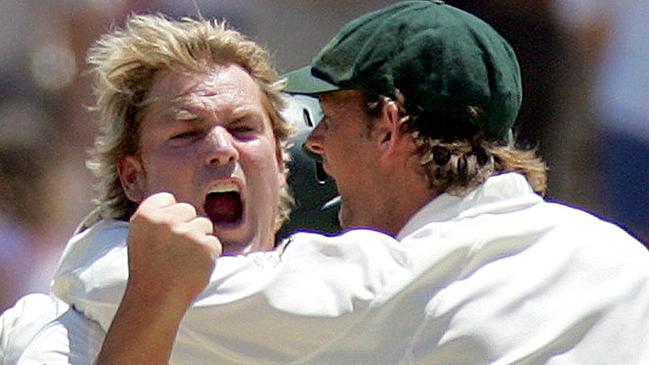
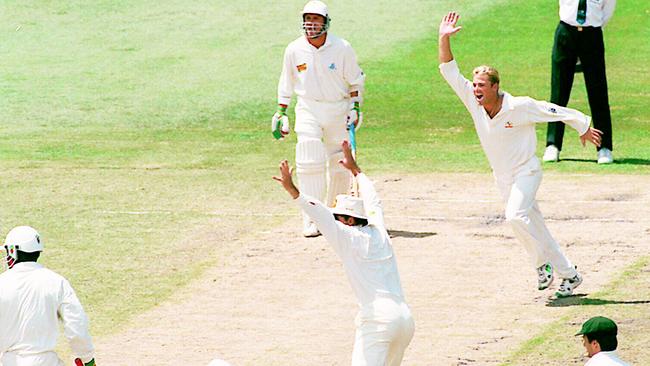
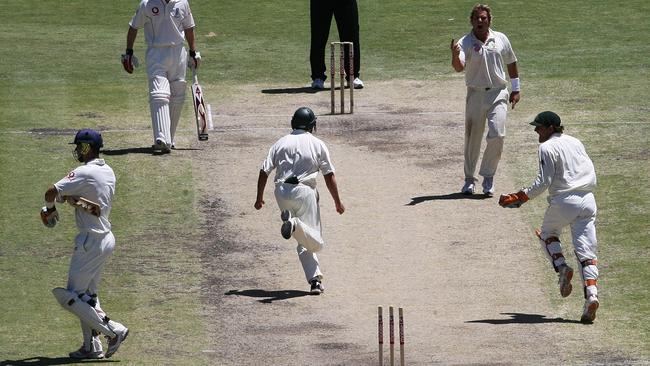
FACING WARNIE: WHY I’D LOST BEFORE I EVEN STARTED
It was the wait. Shane Warne never bowled until he was ready. With the ball in his hand, he was completely in charge, and he let everyone in the ground, and most especially the batsman on strike, know that was the case.
I actually faced Warne for only a few balls in county cricket, with the last of them ending up in the hands of slip when I was certain it was going out on the leg side for an easy single, but even in that short time I was thinking, ‘Just get on with it, will you?’ Which is exactly what he wanted. I’d lost before I’d started.
“It was my domain, I owned it,” Warne explained what he was thinking about at the end of his mark in the brilliant recently released documentary about his life and career. “Nothing could happen until I let go of the ball. I played it at my pace.”
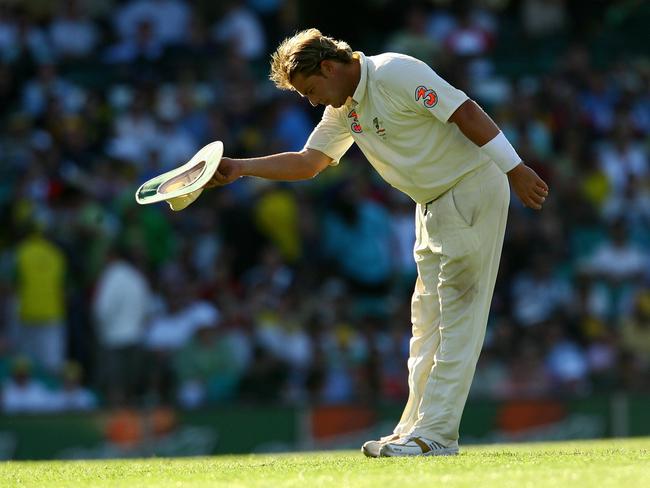
Warne would stand at the end of that mark and stare at you. He would survey the field and make a small adjustment here and there. Sometimes he would have a plan, and indeed he was one of the game’s great thinkers and strategisers, but often he was just creating an illusion, sometimes moving a fielder back and forth so that he was actually back standing where he had been before Warne’s bit of theatre.
As he admitted in his book, No Spin, written with the former Hampshire captain Mark Nicholas, “The art of leg spin is creating something that is not really there. It is a magic trick, surrounded by mystery, aura and fear.”
Young players are often advised that they should play the ball and not the man (or woman), but in no battle was that ever harder than when facing Warne. The man was mesmerising.
Before him no spinner had ever had that effect on opponents. Yes, they had obviously troubled the batsmen with their wiles, but no one had ever got inside the mind of a batsman like Warne did. The smiling assassin Muttiah Muralitharan did not do that.

Warne scared batsmen. That was previously only the preserve of snarling fast bowlers. As Warne said in that documentary, “One of my strengths was that I could intimidate people. I was a man on a mission, I wasn’t taking any prisoners. I wouldn’t have liked to have played against me. I was nasty.”
Indeed, he could be. Some of his language was rather industrial, to put it mildly, but that was just his competitive nature and an Australian cricket upbringing immersed in sledging coming through. Off the field he was always charming, and helpful too.
If he could give advice to another leg spinner he would. Last year I sent him, via my colleague Mike Atherton, some footage of a young ‘leggie’ I coach and he immediately responded with a video full of encouragement and one particular piece of superb technical counsel.
As a bowler Warne just never wanted the batsman to feel comfortable. “If you batted against him for a session you would be utterly exhausted,” Andrew Strauss observed in the documentary.
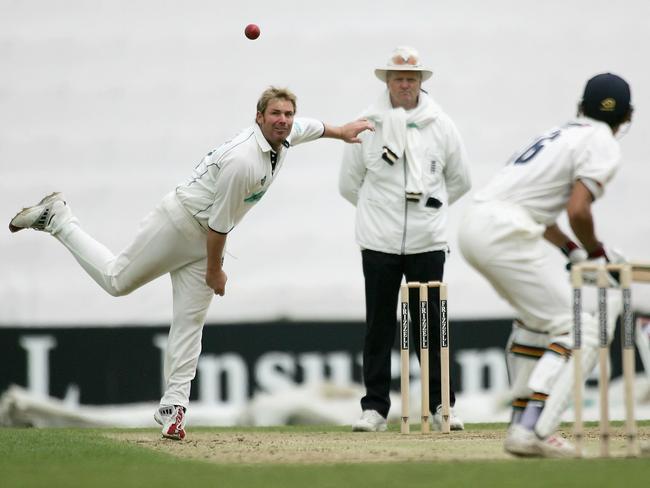
Warne was as much an analyst as a psychologist too. The first time I played against him I quickly became aware that he was watching my every movement. He did that with every batsman. He was looking for clues in the stance, the grip, where a player liked to score, whether he was happier defending or attacking, and much, much more. He had no need for an analyst on the sidelines. He did the work himself and there in his own head it remained.
He was once flummoxed a little by the West Indies batsman Carl Hooper, who was a magnificent player of spin. He could not find the clue, as he could immediately with most players, of when Hooper was going to advance down the wicket at him.
He even stopped at the moment of delivery a couple of times to see what Hooper was revealing. Warne naturally persevered and eventually worked out that Hooper usually looked down in his stance, but when coming down the pitch he did not do that, fixing Warne with his eyes throughout.
The skill levels were remarkable. Leg spin is the most difficult of arts. Bad balls are an occupational hazard, and fields are set accordingly, but Warne took the art to another level with his accuracy. He had all the tricks: the leg-spinner, the googly (or at least until he did so until 1998 when his shoulder went), the flipper (out of the front of the hand with backspin on it) and a variety of balls that went straight on from the side of his hand and had different names like zooters and sliders, all helped by his having huge hands and strong wrists, strengthened as a child when he broke both legs.

Under the guidance of his mentor, the late Terry Jenner, he learnt how and when to use those variations. He became a master of using the crease and of setting up a batsman. Pulling or cutting his rare short balls was a dangerous option, because the follow-up was often a flipper of the same length that skidded on, leaving the batsman, for instance Alec Stewart at Brisbane in the 1994/95 Ashes, either bowled or leg-before, and highly embarrassed.
Warne could do that. With a ball in his hand he could embarrass, he could intimidate, he could attack, he could defend. He could do everything.

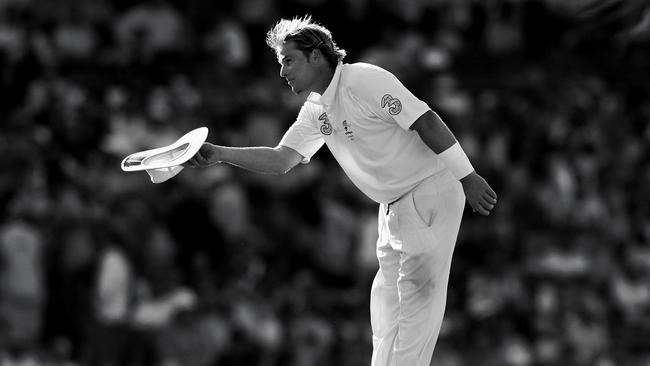
Add your comment to this story
To join the conversation, please log in. Don't have an account? Register
Join the conversation, you are commenting as Logout
Son of a Test legend back on track after quitting cricket
Austin Waugh, the son of Test legend Stephen, has rocketed back from the wilderness to snare his first senior NSW cap and is following his dream of becoming a professional cricketer.
The 100 most influential women in Australian sport revealed
They’re some of the biggest names in the country – world champions, powerful executives, perennial winners and the secret stars behind the scenes. Here's our 2025 edition of Australian sport’s most powerful women.